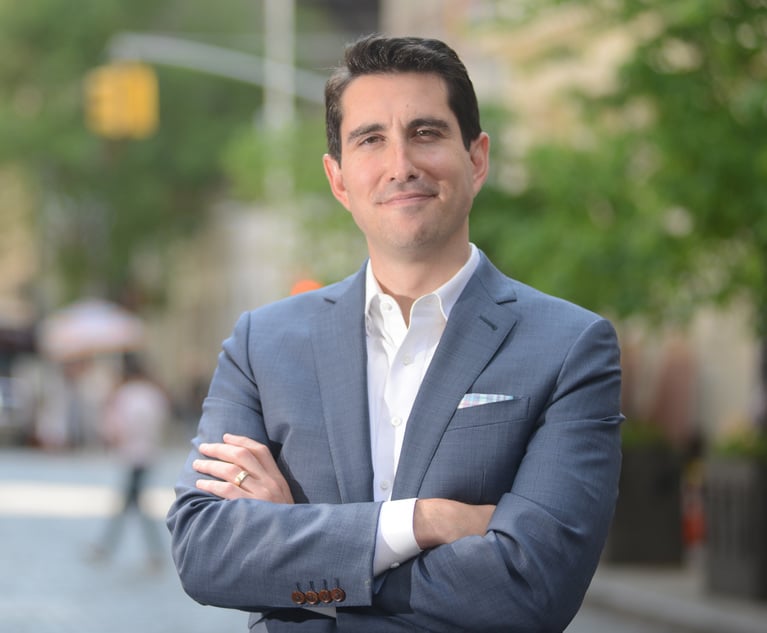For Law Firm GCs, Dealing With Partners' Conduct Can be a 'Tightrope'
“It makes no difference to me whether it's one of my closest friends or a partner I have never met,” said Nicholas Gravante, GC of Boies Schiller. “My obligation is to the firm. The firm is my client.”
November 20, 2017 at 04:48 PM
4 minute read
 Nicholas Gravante of Boies Schiller Flexner. Free (Handout).
Nicholas Gravante of Boies Schiller Flexner. Free (Handout). When a law firm partner misbehaves, the firm's general counsel is often caught between being a trusted adviser to the partner while representing the best interests of the law firm.
It's an issue that has no doubt plagued many a law firm GC. According to attorney James Jones, there's a real “tightrope to walk” in these situations. Jones, a former partner at Arnold & Porter, is founder of Legal Management Resources, a law firm consultancy that also hosts round tables for law firm general counsel.
Jones divides lawyer conduct into three categories: 1) actions that simply cause a business issue because they may embarrass the firm or be offensive to a firm client; 2) problems that involve a “troubled” employee, such as alcohol or drug abuse, or mental health issues; and, 3) allegations that rise to the level of ethical or legal wrongdoing.
In a scenario that Jones believes could fall into the first category, back in 2011, former U.S. Solicitor General Paul Clement clashed with his law firm, King & Spalding, which did not want him to continue leading the legal charge to support the Defense of Marriage Act. Typically, Jones said, the law firm GC does not become deeply involved in a business matter like this one, but may be part of an executive committee that deals with it.
In troubled employee cases, Jones said the GC normally would work with human resources or bring in a consultant and help reach an agreement with the troubled lawyer on a treatment plan.
But Jones said the law firm general counsel usually finds himself most deeply involved in cases alleging ethical or legal misconduct, which can range from domestic violence to sexual harassment to malpractice.
“When these circumstances arise, there's always the question of whether it is a reportable event to a regulatory authority [i.e., the state bar],” he said. “The general counsel is typically the one to make that decision.”
Several law firm GCs declined to talk about how they handle such problems, but Nicholas Gravante of Boies Schiller Flexner agreed to discuss the topic in general. His law firm has been embroiled in a high-profile controversy of late, over actions taken by firm chairman David Boies while representing Harvey Weinstein.
In that matter, Boies was defending Weinstein from sexual harassment and assault allegations and took action to try and stop The New York Times from writing a story about Weinstein. The Times was also Boies' client at the time. Neither is his client now.
Gravante said he couldn't discuss the Boies case. But in general, he said when a problem with a partner arises, he follows several basic steps.
First, he investigates and gathers the facts. Then, if needed, he brings in outside help. Based in New York City, Gravante said he is not a member of the bar in other states where the law firm has offices. “So I may need to hire and consult with an expert in ethics in any of those states,” he said. “And sometimes I have to do that even in New York, because I am not an ethics expert. I am an active litigator with a full docket of cases, which is a model a lot of firms use” for their general counsel.
He said he then determines if the behavior is required to be reported externally to the bar, and/or internally to the firm's executive committee. If it goes to the committee, of which he is a member, Gravante said he would include a recommendation for action that can range from a reprimand, up to dismissal of the lawyer.
Jones said one of a law firm GC's most difficult issues is having to deal with a partner who may also be a close friend. But Gravante said that is not a tough call for him.
“It makes no difference to me whether it's one of my closest friends or a partner I have never met,” Gravante said. “My obligation is to the firm. The firm is my client.”
This content has been archived. It is available through our partners, LexisNexis® and Bloomberg Law.
To view this content, please continue to their sites.
Not a Lexis Subscriber?
Subscribe Now
Not a Bloomberg Law Subscriber?
Subscribe Now
NOT FOR REPRINT
© 2025 ALM Global, LLC, All Rights Reserved. Request academic re-use from www.copyright.com. All other uses, submit a request to [email protected]. For more information visit Asset & Logo Licensing.
You Might Like
View All
Survey Finds Majority of Legal Professionals Still Intimidated by AI Despite Need to Streamline Mounting Caseloads

Kraken’s Chief Legal Officer Exits, Eyes Role in Trump Administration
3 minute read
FTC Chair Lina Khan Sues John Deere Over 'Right to Repair,' Infuriates Successor
6 minute read
‘Facebook’s Descent Into Toxic Masculinity’ Prompts Stanford Professor to Drop Meta as Client
6 minute readTrending Stories
- 1Class Action Settlements Totaled $40B+ Three Years in a Row: 'We’re in a New Era'
- 2Automaker Pleads Guilty and Agrees to $1.6 Billion in Payouts
- 3MLB's Texas Rangers Search For a New GC and a Broadcasting Deal
- 4Does the Treasury Hack Underscore a Big Problem for the Private Sector?
- 5Gen AI Legal Tech Startup Eve Raises $47 Million Series A Investment
Who Got The Work
J. Brugh Lower of Gibbons has entered an appearance for industrial equipment supplier Devco Corporation in a pending trademark infringement lawsuit. The suit, accusing the defendant of selling knock-off Graco products, was filed Dec. 18 in New Jersey District Court by Rivkin Radler on behalf of Graco Inc. and Graco Minnesota. The case, assigned to U.S. District Judge Zahid N. Quraishi, is 3:24-cv-11294, Graco Inc. et al v. Devco Corporation.
Who Got The Work
Rebecca Maller-Stein and Kent A. Yalowitz of Arnold & Porter Kaye Scholer have entered their appearances for Hanaco Venture Capital and its executives, Lior Prosor and David Frankel, in a pending securities lawsuit. The action, filed on Dec. 24 in New York Southern District Court by Zell, Aron & Co. on behalf of Goldeneye Advisors, accuses the defendants of negligently and fraudulently managing the plaintiff's $1 million investment. The case, assigned to U.S. District Judge Vernon S. Broderick, is 1:24-cv-09918, Goldeneye Advisors, LLC v. Hanaco Venture Capital, Ltd. et al.
Who Got The Work
Attorneys from A&O Shearman has stepped in as defense counsel for Toronto-Dominion Bank and other defendants in a pending securities class action. The suit, filed Dec. 11 in New York Southern District Court by Bleichmar Fonti & Auld, accuses the defendants of concealing the bank's 'pervasive' deficiencies in regards to its compliance with the Bank Secrecy Act and the quality of its anti-money laundering controls. The case, assigned to U.S. District Judge Arun Subramanian, is 1:24-cv-09445, Gonzalez v. The Toronto-Dominion Bank et al.
Who Got The Work
Crown Castle International, a Pennsylvania company providing shared communications infrastructure, has turned to Luke D. Wolf of Gordon Rees Scully Mansukhani to fend off a pending breach-of-contract lawsuit. The court action, filed Nov. 25 in Michigan Eastern District Court by Hooper Hathaway PC on behalf of The Town Residences LLC, accuses Crown Castle of failing to transfer approximately $30,000 in utility payments from T-Mobile in breach of a roof-top lease and assignment agreement. The case, assigned to U.S. District Judge Susan K. Declercq, is 2:24-cv-13131, The Town Residences LLC v. T-Mobile US, Inc. et al.
Who Got The Work
Wilfred P. Coronato and Daniel M. Schwartz of McCarter & English have stepped in as defense counsel to Electrolux Home Products Inc. in a pending product liability lawsuit. The court action, filed Nov. 26 in New York Eastern District Court by Poulos Lopiccolo PC and Nagel Rice LLP on behalf of David Stern, alleges that the defendant's refrigerators’ drawers and shelving repeatedly break and fall apart within months after purchase. The case, assigned to U.S. District Judge Joan M. Azrack, is 2:24-cv-08204, Stern v. Electrolux Home Products, Inc.
Featured Firms
Law Offices of Gary Martin Hays & Associates, P.C.
(470) 294-1674
Law Offices of Mark E. Salomone
(857) 444-6468
Smith & Hassler
(713) 739-1250






